News
NATIONAL CONFERENCE ON “ROAD MAP FOR SMART CITIES OF RAJASTHAN” ON 5-6TH APRIL 2017
- April 24, 2017
- Posted by: admin
- Category: News
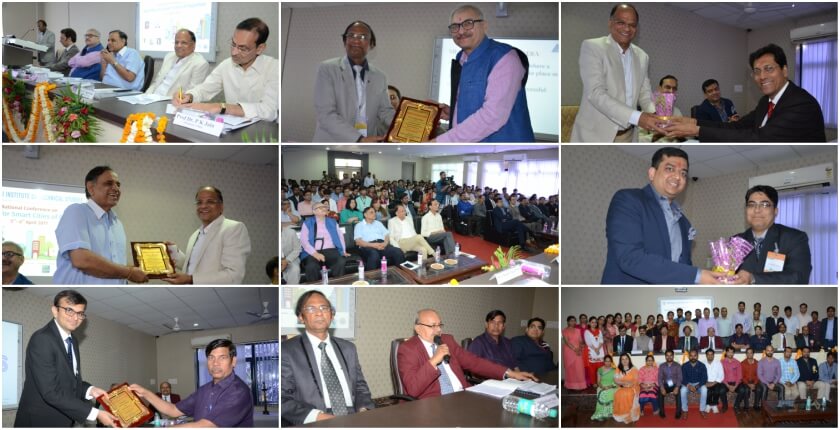
Geetanjali Institute of Technical Studies, Dabok successfully organised for the first time in Rajasthan a National Conference on “Road Map for Smart Cities of Rajasthan” which was contributed by eminent officials from prestigious organizations, consultants, experts and engineers from various areas of urban planning and development who expressed their valuable insights on Smart Cities.
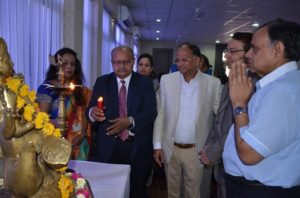 The conference commenced with the ritual of lamp lightning by the Chief Guest, Prof. Dr. M.N. Patel, Former Vice-Chancellor Gujarat Technological University, the Keynote Speaker, Prof. Chetan Vaidya, Director, School of Planning, New Delhi, Shri J.P.Agarwal, Chairman of the Geetanjali Group, Shri Kapil Agarwal, Vice-Chairman Geetanjali Group, Prof. Dr. K.N. Sheth Director -GITS, Finance Controller B.L. Jangir and the conference convenors, Dr. Manish Varma and Prof. Rajeev Mathur, to invoke the blessings of Goddess Saraswati.
The conference commenced with the ritual of lamp lightning by the Chief Guest, Prof. Dr. M.N. Patel, Former Vice-Chancellor Gujarat Technological University, the Keynote Speaker, Prof. Chetan Vaidya, Director, School of Planning, New Delhi, Shri J.P.Agarwal, Chairman of the Geetanjali Group, Shri Kapil Agarwal, Vice-Chairman Geetanjali Group, Prof. Dr. K.N. Sheth Director -GITS, Finance Controller B.L. Jangir and the conference convenors, Dr. Manish Varma and Prof. Rajeev Mathur, to invoke the blessings of Goddess Saraswati.
In the beginning of the conference Prof. Dr. K.N. Sheth, Director, GITS welcomed all the guests and stated that the prime objective of the National Conference was to synthesize an emerging understanding of the smart city concept, determine major research themes, and fill gaps in the current Smart cities programs. The conference was a platform for assimilation of knowledge and experiences of experts involved in the planning an implementation of the Smart Cities Mission to help in the development of Udaipur as a smart city.
On the Inaugural day of the national conference, Prof. Dr. M.N. Patel, Former Vice-Chancellor Gujarat Technological University and Gujarat University was the Chief Guest and the Keynote speakers were Prof. Chetan Vaidya, Director, School of Planning Govt. of India, New Delhi, Mr. Pratap Padode, Founder & Director, Smart Cities Council India Mumbai and Shri J.P. Agarwal, Chairman Geetanjali Group and the Sessions Chair, Dr. Rajnikant Patel, Honorary Director, Gujarat Technological University and GSSCD .
The first keynote speaker Prof. Chetan Vaidya, Director, School of Planning, Government of India, New Delhi discussed an overview of “Emerging Urban Agenda for India” and elaborated on several objectives of central government such as improvements in capacity building, imparting technical education, urban trends issues etc. Prof. Vaidya said that development needs to be sustainable and inclusive of economic, financial and environmental development. He further briefed the gathering on the five urban missions initiated by the Prime Minister Shri Narendra Modi; these include AMRUT, Smart City, HRIDAY, Housing for All and Swachh Bharat Mission.
He concluded his speech by giving a message to youth that they are fortunate to be in India as it is the only country which will see lots of construction and development work and gave the students the 3-point-success mantra; passion, focus and hard work.
His address was followed by the presentation of Keynote Speaker, Sh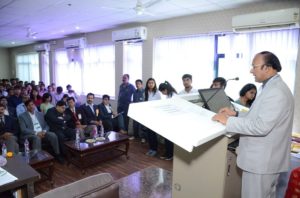 ri Pratap Padode, Founder & Director, Smart Cities Council India, Mumbai, who explained how smart cities project was the logical extension of his work in infrastructure research and proudly announced that the Smart cities concept and mission is an inspirational model for it is progressing at a fast pace and has maintained the timelines set by the government. He stated that the cities have a contribution of more than 60%in GDP and the population in the cities doubled from 2003 to 2017 and the biggest challenge of the mission is to change the mindset of people. He shared some options by which efficiency and sustainability can be achieved in the existing system by the use of bio-metric machines, recycling of water supply to industries, CCTV cameras to reduce crime, proper street lights, conversion of wastage into compost, e-governance mechanism, credit rating for finance records to be maintained as per the funds distributed etc. He emphasised the importance of knowledge sharing and communication for development of smart cities.
ri Pratap Padode, Founder & Director, Smart Cities Council India, Mumbai, who explained how smart cities project was the logical extension of his work in infrastructure research and proudly announced that the Smart cities concept and mission is an inspirational model for it is progressing at a fast pace and has maintained the timelines set by the government. He stated that the cities have a contribution of more than 60%in GDP and the population in the cities doubled from 2003 to 2017 and the biggest challenge of the mission is to change the mindset of people. He shared some options by which efficiency and sustainability can be achieved in the existing system by the use of bio-metric machines, recycling of water supply to industries, CCTV cameras to reduce crime, proper street lights, conversion of wastage into compost, e-governance mechanism, credit rating for finance records to be maintained as per the funds distributed etc. He emphasised the importance of knowledge sharing and communication for development of smart cities.
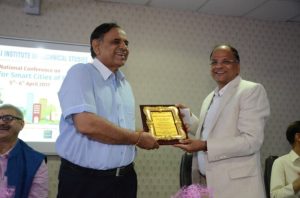 The Chief Guest of the conference Prof. M.N. Patel, Former Vice Chancellor, Gujarat University defined the smart city as a place of comfortable living and convenience to civilians and that to develop smart cities, we need to educate, train, create awareness and change our mindsets. He added that Smart Cities Project and research is evolving as a job provider and a platform for nurturing of ideas for the development of India.
The Chief Guest of the conference Prof. M.N. Patel, Former Vice Chancellor, Gujarat University defined the smart city as a place of comfortable living and convenience to civilians and that to develop smart cities, we need to educate, train, create awareness and change our mindsets. He added that Smart Cities Project and research is evolving as a job provider and a platform for nurturing of ideas for the development of India.
Shri J.P. Agarwal, Chairman, Geetanjali Group appreciated the vision of Smart City initiated by Honorable Prime Minister Shri Narendra Modi. He said that visionary people are necessary for the successful implementation the success of these development missions. He expressed his resolution to contribute to the development of the city and country by providing a knowledge hub and research centre in the institute where the educationists and researches will design and impart training programs to municipal officials on how to execute and implement smart technologies.
The post-lunch technical sessions was chaired by the most esteemed and amiable Dr. Rajnikant Patel, Honorary Director, Gujarat Technological University and GSSCD. The technical sessions on the first day had expert technical sessions on Smart Cities-Planning by Mr. Pankaj Gupta from GIFT city, Gandhinagar, Prof. Dr. Indu Rao and Prof. Dr. Sejal Patel from CEPT University and Prof. Debasis Sanjib Sarkar from PDP University.
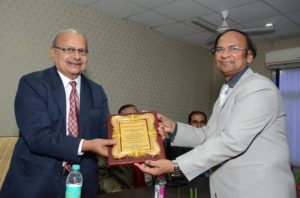
Mr. Pankaj Gupta, SVP, IL&FS (GIFT CITY) spoke on how bad governance at micro and macro levels is the cause of all the mess we have in cities and the country. ‘Smart Cities’ according to him was about smart thinking and smart solutions for the problems. He emphasised that planning now should be focused on smart towns and smart village which should focus on enhanced liveability, enhanced workability and enhanced sustainability.
In the technical session on 5th April, Dr. Indu Rao stressed the need for filling the lacuna in the areas of Intuition- building, innovation and developing a progressive organisational culture. She said that finance and technology were not limiting the limiting factors for India, but organisational culture is what needs to be developed. Culture drives individuals on organisational level and we do not achieve the expected outcome because we do not have the appropriate organisational culture in our social and economical set up.
During the second technical presentation by Prof. Dr. Sejal Patel, she elaborated on the genesis of the Smart Cities concept globally and its arrival in India. While decoding of the Smart Cities concept, she explained how the concept of liveable cities focusing on the quality of life transformed to wider dimensions of economic competitiveness and environment sustainability. Dr. Sejal Patel deliberated on the Smart City plan for Udaipur and the budgets sanctioned for Pan City development and Area- Based Development for Udaipur.
The Project Management Expert from PDP University, Dr. Dabasis Sanjib Sarkar enumerated numerous models and analysis methodologies of Infrastructure Risk Management that are applicable in infrastructure development for cities and presented citations from his experiences while working on the landmark Delhi Metro project.
Three sessions for paper presentation by Dr. Manish Varma & Prof. Rajeev Mathur, Dr. P C Bapna & Dr. V R Raghuveer and Hemant Sahu & Vishnu Agarwal were conducted.
The second day of the conference was chaired by Dr. Rajnikant Patel and co-chair Prof. B. L. Chaudhary, Chairman, RBSE with expert speakers- Shri VP Rathi, President, UCCI, Prof. P. K. Jain from FMS, MLSU, Dr. Mithesh M. Dadhania, Principal, Asia Pacific Institute of Hotel Management, Ahemdabad and Shri Shamik Joshi, Associate Director, Price Waterhouse Cooper, India.
The major areas under the prime domain i.e. Smart Cities the session were managerial and financial aspects of smart cities mission including public private partnership model, contribution of the government, local bodies and its citizens with the main focus areas being improvement in efficiency of regulatory bodies and effective governance.
Shri VP Rathi, President, UCCI, expressed his happiness to be a part of such prestigious gathering and deliberated that the contribution and participation of all citizens was necessary to develop the country. He said that the Chambers aspires to help in the development of the nation by sharing the knowledge and technical expertise of the industry.
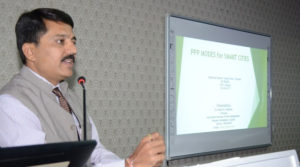
Dr. Mithesh M. Dadhania, Principal, Asia Pacific Institute of Hotel Management, in his technical session on managerial aspect of the Smart Cities concept, explained the PPP model, wherein the ownership, responsibility, risks and management of the Smart Cities is shared by the public and private entities under the BOT contract (Build- Operate- Transfer) where private partners also take on investment and financing risks. PPP projects worth Rs.1327.67 crores have been implemented in the Smart Cities mission.
The last technical session presented by Mr Shamik Joshi, Associate Director, Price Waterhouse Cooper, India focused on the 8 big – challenges in urban India, namely water, power & energy, waste & sanitation, mobility, healthcare, education, built environment and governance. He informed that the concept of Smart Cities was initiated to address these challenges. Further, to overcome the hurdles and challenges, the planners should identify the DNA of the city i.e. identify the key characteristics of the city and develop a vision for the city, identify the key areas that the city needs to focus upon; then develop the Key- Performance Indicators and measure the KPIs while implementing and executing the development programmes.
In the concluding address as Session Chair, Dr. Rajnikant Patel remarked that the conference has provided good insights on various spheres of Smart Cities like digital and information technologies, urban planning best practices, public private partnerships, and policy change etc.
Prof Rajnikant explained the need for urban leaders to seek multipurpose and locally-driven solutions can indeed support cities to become not just smarter, but also more inclusive, both of which can improve the lives of poor and vulnerable people. The focus now through the Asian Cities Climate Change Resilience Network (ACCCRN) and by 100 Resilient Cities – pioneered by The Rockefeller Foundation, the government and consultants are planning to equip and prepare for as well as take preventive measures for crises resulting from the convergence of climate change, urbanisation and globalisation. He defined in detail the concepts of Retrofitting / Redevelopment / Green Field development and Pan -city development and shed light on the four types of smart cities development of Retrofitting type like Bhadra Fort, Redevelopment type like Sabarmati River front, Green field type like GIFT City and Pan City like BRTS service which covers the whole population.
Prof Rajnikant also deliberated on the potential solutions used by various Smart City planners in GIFT City, Surat and Baroda for urban planning like adoption of sustainable energy systems, recycling and efficient and clean public hygiene systems. He said that the Smart Villages Mission needs to be implemented parallel to the Smart Cities mission, which should focus on identifying and solving the challenges in building liveable, modern and efficient towns for saving cities from overcrowding and collapse of basic communal and social infrastructure.
Prof. Patel was instrumental in making the conference a big success and the Prof. Dr. K.N. Sheth on behalf of the institute expressed his heartfelt gratitude for his support in many direct and indirect ways in organising the conference. 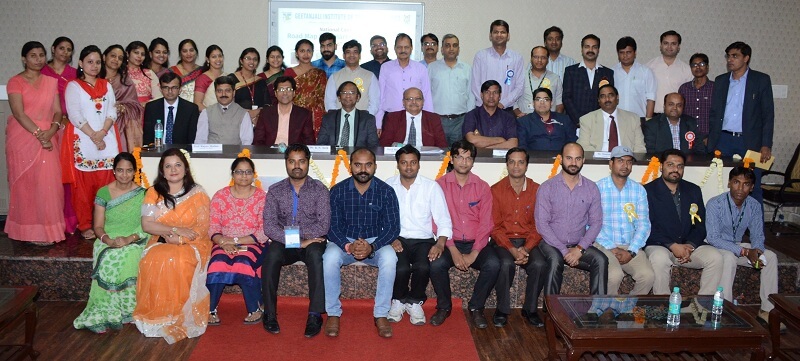
The feedback of the National Conference on “Road Map for Smart Cities of Rajasthan” was presented by Ms. Shailja Ranawat and Mr. Shakti Singh Shekhawat who reported that the success of this National Conference was evident from the fact that we received over 50 research papers and 20 additional papers from the Experts on ‘Smart Cities’.
In the valedictory address, the Director, Prof. Dr. K.N. Sheth stated that the conference had made a major contribution in enhancing the understanding of the strategic and operational levels of the Smart Cities Mission. He informed that, “GITS will set-up a Centre of Excellence for Smart City development and also establish a Smart City Sensor Lab in the institute. We plan to design and impart training programs to municipal officials on how to execute and implement smart technologies.”
The anchoring was done by Ms. Anjali Dhabhai and Ms. Shalini Jain while the vote of thanks was given by Dr. Radha Choudhary and Prof. Rajeev Mathur.
NATIONAL CONFERENCE ON “ROAD MAP FOR SMART CITIES OF RAJASTHAN” ON 5-6TH APRIL 2017
-
4th International Conference on Multi-Disciplinary Application & Research Technologies (ICMART-2025) – Hybrid Conference
-
PROCEEDING OF ISET 2024
-
3rd INTERNATIONAL CONFERENCE ON MULTI-DISCIPLINARY APPLICATION & RESEARCH TECHNOLOGIES (ICMART-2024)
-
INTERNATIONAL CONFERENCE ON INNOVATION IN SCIENCE, ENGINEERING & TECHNOLOGY
-
An Extension Lecture by Shri J. P. Agarwal, Hon’ble Chairman – Geetanjali Group
Archives
| M | T | W | T | F | S | S |
|---|---|---|---|---|---|---|
| 1 | 2 | 3 | 4 | 5 | 6 | |
| 7 | 8 | 9 | 10 | 11 | 12 | 13 |
| 14 | 15 | 16 | 17 | 18 | 19 | 20 |
| 21 | 22 | 23 | 24 | 25 | 26 | 27 |
| 28 | 29 | 30 | ||||




